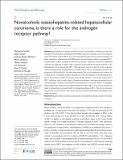| dc.contributor.author | Ali, Mahmoud A | en_US |
| dc.contributor.author | Lacin, Sahin | en_US |
| dc.contributor.author | Abdel-Wahab, Reham | en_US |
| dc.contributor.author | Uemura, Mark | en_US |
| dc.contributor.author | Hassan, Manal | en_US |
| dc.contributor.author | Rashid, Asif | en_US |
| dc.contributor.author | Duda, Dan G | en_US |
| dc.contributor.author | Kaseb, Ahmed O | en_US |
| dc.date.accessioned | 2017-05-01T19:27:18Z | |
| dc.date.issued | 2017 | en_US |
| dc.identifier.citation | Ali, Mahmoud A, Sahin Lacin, Reham Abdel-Wahab, Mark Uemura, Manal Hassan, Asif Rashid, Dan G Duda, and Ahmed O Kaseb. 2017. “Nonalcoholic steatohepatitis-related hepatocellular carcinoma: is there a role for the androgen receptor pathway?” OncoTargets and therapy 10 (1): 1403-1412. doi:10.2147/OTT.S111681. http://dx.doi.org/10.2147/OTT.S111681. | en |
| dc.identifier.issn | | en |
| dc.identifier.uri | http://nrs.harvard.edu/urn-3:HUL.InstRepos:32630547 | |
| dc.description.abstract | The epidemic of insulin resistance, obesity, and metabolic syndrome has led to the emergence of nonalcoholic steatohepatitis (NASH) as the most common cause of liver disease in the US. Patients with NASH are at an increased risk for hepatic disease-related morbidity and death, and chronic inflammation in NASH patients can lead to hepatocellular carcinoma (HCC). The prevalence of HCC is higher in males than in females, and genetic studies have identified androgen and androgen receptors (ARs) as partially responsible for the gender disparity in the development of liver disease and HCC. Although many factors are known to play important roles in the progression of inflammation in NASH patients, the role of androgen and AR in the progression of NASH to HCC has been understudied. This review summarizes the evidence for a potential role of androgen and the AR pathway in the development of NASH-related HCC and in the treatment of HCC. It has been proposed that AR plays a role in the progression of HCC: inhibitory roles in early stages of hepatocarcinogenesis and tumor-promoting roles in advanced stages. AR can be activated by several pathways, even in the absence of androgen. While AR has been explored as a potential therapeutic target in HCC, several clinical trials have failed to demonstrate a clinical benefit of antiandrogen drugs in HCC. This review discusses the potential reason for these observations and discuss the potential future trials design in this important setting. | en |
| dc.language.iso | en_US | en |
| dc.publisher | Dove Medical Press | en |
| dc.relation.isversionof | doi:10.2147/OTT.S111681 | en |
| dc.relation.hasversion | http://www.ncbi.nlm.nih.gov/pmc/articles/PMC5344425/pdf/ | en |
| dash.license | LAA | en_US |
| dc.subject | hepatocellular carcinoma | en |
| dc.subject | nonalcoholic steatohepatitis | en |
| dc.subject | androgen receptor | en |
| dc.subject | flutamide | en |
| dc.subject | sorafenib | en |
| dc.title | Nonalcoholic steatohepatitis-related hepatocellular carcinoma: is there a role for the androgen receptor pathway? | en |
| dc.type | Journal Article | en_US |
| dc.description.version | Version of Record | en |
| dc.relation.journal | OncoTargets and therapy | en |
| dash.depositing.author | Duda, Dan G | en_US |
| dc.date.available | 2017-05-01T19:27:18Z | |
| dc.identifier.doi | 10.2147/OTT.S111681 | * |
| dash.contributor.affiliated | Duda, Dan | |


